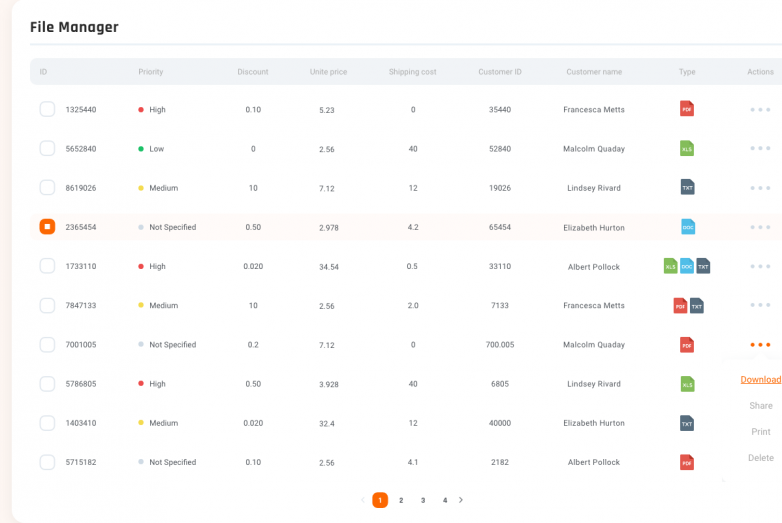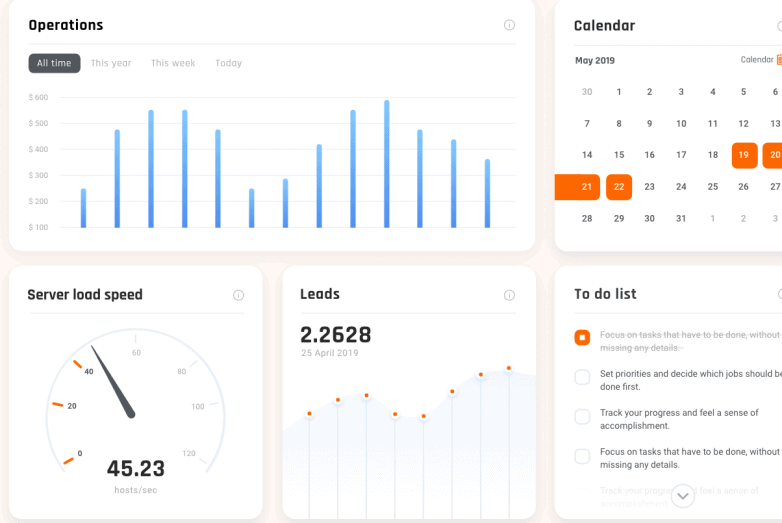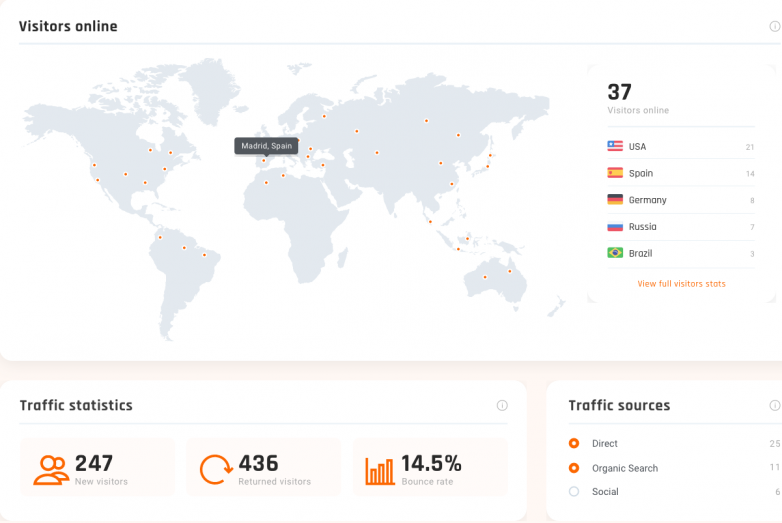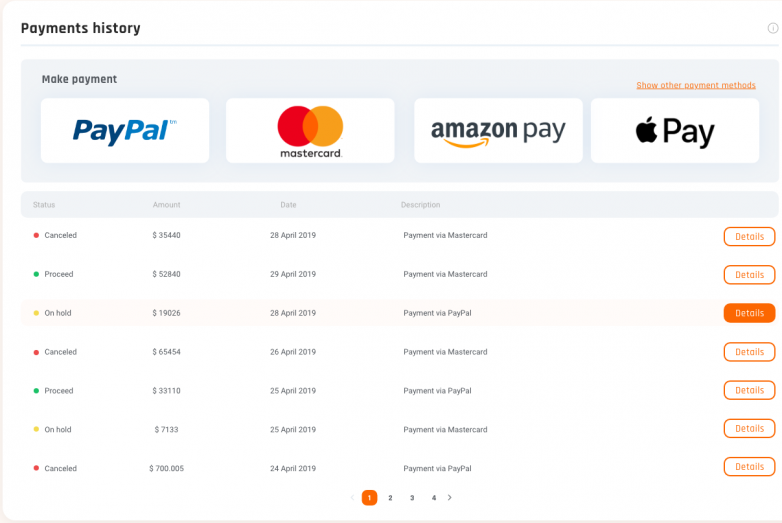
The Best CRM Solutions
for Manufacturing Industry
Solutions Metrix offers industry-leading CRM consulting, implementation, and support services.
CRM for manufacturing is software that helps companies track sales, and boost productivity.
We have everything you need to stay ahead of the manufacturing digital transformation.
Over 30
CLIENTS
Centralized Customer and Partner Information
Manufacturers have many direct and indirect customers within their different sales channels. All customers and partners have different information that provides insights on them, allowing for proper segmentation and personalized interactions. CRM centralizes all of its information and interactions in one location to achieve a full 360-degree view of all customers and partners. No more Excel spreadsheets left and right!


Define and Streamline Sales Channels
Now more than ever, manufacturers of all types of products are selling through various sales channels that involve collaborating with partners such as distributors, dealers, and installers. The goal is to make sure their products reach a satisfied end consumer. CRM defines and streamlines all activities specific to each sales channel. You can automatically push new leads to a relevant partner and monitor their interactions. Set goals and forecasts, and use embedded reports and dashboards to get insights on these goals’ achievements.
Optimize Merchandising Activities
Optimize your sales reps’ routes by using the latest Google mapping technologies within an intuitive and powerful application from their mobile phone or tablet. Easily perform store visits and evaluate the current state of your products against your competitors’. Identify competitor products and unveil the advantages of your offering versus theirs.


Seamless Customer Service and Warranty Claims Management
Customer service is at the core of every CRM application. Streamline customers getting in touch with your businesses for more information and handle cases and feedback management. Warranty claims processes can be personalized for each client to ensure you can adhere to the best practices while enabling your specific requirements.
Clients’ Warm Words about Our CRM Consulting Services

“Thanks very much for your great support on this project. It was a pleasure working with you.”
"Thanks Olivier! A big thanks on turning around solutions so quickly in the last couple of weeks for the slight issues we discovered. The team went live with the safety abroad system on Wednesday and I couldn’t be happier!"


Looking to Upgrade Your Current CRM
or
Make the Switch to a Better System?
Manufacturing CRM Frequently Asked Questions
FAQs
What Is CRM in Manufacturing?
Customer Relationship Management (CRM) in manufacturing refers to software and strategies designed to help manufacturers build stronger relationships with customers, streamline sales processes, and enhance overall business performance. It’s not just about managing contacts; it’s about understanding customer needs and delivering value at every touchpoint. The best CRM for manufacturing integrates seamlessly with your existing systems, like ERP, and provides real-time insights into sales pipelines, production schedules, and customer behavior. These tools empower manufacturers to anticipate demand, improve product quality, and deliver on-time solutions. CRM solutions for manufacturing also tackle unique challenges like managing distributors, suppliers, and complex B2B sales cycles. With features like order tracking, inventory management, and predictive analytics, CRM software for manufacturing companies transforms how businesses interact with their clients and partners. Why should you adopt CRM in manufacturing? The benefits are clear. It enhances operational efficiency, builds customer loyalty, and helps your business stay competitive. A well-implemented CRM system doesn’t just improve sales; it supports long-term growth by aligning your manufacturing processes with customer expectations. Whether you’re a small business or a global enterprise, adopting CRM is a smart move to future-proof your operations.
What Are the Best Manufacturing Customer Relationship Management Solutions?
The best CRM for manufacturing industry needs to align with your business size, goals, and operational complexity. Leading options include Salesforce, Microsoft Dynamics 365, and Creatio. Each excels in different areas, from sales forecasting to seamless integration with production systems. But the best manufacturing CRM for you depends on your unique requirements. When exploring types of manufacturing CRM software, consider those designed for B2B relationships, supply chain management, or customer lifecycle tracking. Some CRMs, like Creatio, offer customizations for manufacturers focused on precision and scalability. CRM adoption in manufacturing is growing as businesses realize its value. With features like order tracking, inventory management, and production planning, CRMs streamline operations and enhance customer satisfaction. Integration with ERP systems is often a game-changer, ensuring smooth data flow across departments. To choose the best manufacturing CRM, evaluate your priorities. Do you need robust reporting, mobile accessibility, or IoT compatibility? Consider software that boosts both productivity and profitability. Ultimately, the right CRM should adapt to your growth while solving current challenges. Take your time to research, request demos, and involve your team. A well-chosen CRM can transform your manufacturing operations for years to come.
How to Select the Best CRM for Your Manufacturing Company?
Choosing the best CRM for manufacturing companies involves understanding your specific needs and aligning them with the features offered by CRM software. Start by identifying your primary challenges. Do you need better customer relationship management? Streamlined order tracking? Or enhanced collaboration between sales and production? Defining these goals helps narrow down the options. Next, look for CRM solutions for manufacturing that provide industry-specific tools. Features like inventory management, production scheduling, and supply chain integration can significantly improve your operations. The best CRM for manufacturing businesses will also support scalability, ensuring it grows with your company’s needs. Customization is key. No two manufacturing companies are alike, so choose CRM software for a manufacturing company that can be tailored to your workflows. Additionally, ensure it integrates with existing systems, such as your ERP or accounting software. Finally, don’t overlook usability and training. The most advanced CRM is only effective if your team can use it efficiently. Choose a solution with a user-friendly interface and robust training resources. By carefully evaluating these factors, you’ll find the best CRM for your manufacturing business—one that boosts productivity, improves customer relationships, and drives growth.
How Can CRMs Be Used as a Strategic Tool in the Manufacturing Industry?
CRMs have the potential to completely transform the manufacturing industry by improving customer relations and expediting procedures. In the manufacturing industry, maintaining strong relationships with clients and suppliers is essential for growth. A manufacturing CRM solution helps achieve this by centralizing customer data, improving communication, and providing insights into client needs and trends. For smaller businesses, CRM software for small manufacturing companies is a game-changer. It allows them to compete with larger firms by offering tools to track sales pipelines, manage orders, and anticipate customer demands. These systems can integrate seamlessly with other tools, such as inventory and production management software, to create a cohesive workflow. One key benefit of customer relationship management in the manufacturing industry is its ability to forecast demand accurately. By analyzing historical data and customer behavior, manufacturers can optimize production schedules and reduce waste. Additionally, CRMs enhance post-sales support, ensuring long-term customer satisfaction and loyalty. CRM for manufacturing industry is more than just a tool—it’s a strategic ally. Whether it’s nurturing leads, automating routine tasks, or delivering personalized experiences, a CRM empowers manufacturers to build stronger relationships and achieve sustainable growth.
What Are the Benefits of CRM in Manufacturing?
CRM for manufacturing offers a range of benefits that can transform how manufacturing companies operate. At its core, a CRM system centralizes customer and operational data, ensuring that sales, production, and customer service teams stay aligned. This streamlined communication leads to faster decision-making and improved customer satisfaction. For small manufacturing businesses, finding the best CRM for small manufacturing business is especially critical. These systems cater to their unique needs, offering tools for lead management, customer tracking, and after-sales service without the complexity or cost of larger systems. Another significant advantage is integration with manufacturing automation software. Modern CRMs can connect with production tools, enabling companies to synchronize inventory, track orders in real time, and anticipate customer demand more accurately. This reduces waste and increases efficiency. Moreover, CRM for manufacturing companies supports better forecasting. By analyzing historical data, businesses can identify trends and prepare for future demands. This helps manufacturers reduce downtime and maintain optimal production levels. Ultimately, investing in the right CRM system not only boosts productivity but also enhances the customer experience. Whether managing bulk orders or tracking custom projects, a robust CRM ensures manufacturers stay competitive in an ever-evolving market.
How Does a CRM for Manufacturing Work?
A manufacturing industry CRM acts as a central hub that streamlines processes and fosters better communication across departments. It’s designed to help manufacturers manage relationships with customers, suppliers, and partners while improving overall efficiency. Unlike generic management tools, manufacturing CRM software caters specifically to the unique needs of the manufacturing sector. It integrates with other manufacturing management software, creating a unified system that handles everything from order tracking to inventory control. This synchronization ensures real-time data flow, reducing errors and enhancing decision-making. The software provides a 360-degree view of customer interactions. Sales teams can access detailed customer histories, enabling them to tailor solutions and boost satisfaction. Meanwhile, production teams benefit from features like forecasting tools and demand planning, ensuring they’re always ahead of customer needs. One standout advantage of management software manufacturing professionals use is the ability to bridge gaps between sales, production, and delivery. This creates a smoother workflow, faster response times, and better alignment of goals. In short, a manufacturing CRM software is not just a tool. It’s a game-changer that helps manufacturers stay competitive, improve customer loyalty, and optimize operations in today’s fast-paced industry landscape.
What Are the Features to Consider When Selecting Manufacturing CRM?
Selecting the right CRM for manufacturing business requires a balance of essential features and tailored solutions. Start with tools that enhance customer relationship management in manufacturing, such as order tracking, customer communication history, and personalized service. Next, look for production-oriented features. A CRM manufacturing platform should integrate seamlessly with your supply chain, inventory, and production schedules. This ensures real-time visibility into operations and helps manage resources efficiently. Scalability is another key consideration. As your business grows, your CRM should adapt. Whether you’re adding new products or expanding into different markets, a flexible system supports this growth without needing frequent replacements. A strong CRM also serves as a central hub for sales and marketing analytics. By providing actionable insights, it drives better decision-making across departments. Integration with ERP systems is vital, streamlining processes and reducing data silos. Finally, ensure the vendor provides a roadmap to CRM adoption in manufacturing. Training, customization, and ongoing support make the transition smoother for your team. The right system doesn’t just manage operations; it transforms how your manufacturing business connects with customers and optimizes workflows.
What Are Some Examples of the Best CRM Systems for the Manufacturing Industry?
The manufacturing industry thrives on efficiency, streamlined operations, and robust customer relationships. Selecting the right CRM software for a manufacturing company can transform how it manages sales, customer support, and production workflows. Here are some of the best CRM software options for manufacturing businesses:
- Creatio CRM: Known for its no-code capabilities, Creatio CRM excels in automating processes. It’s beneficial for large and small manufacturing businesses looking to scale while optimizing their production and sales cycles without overwhelming their resources.
- Microsoft Dynamics 365: This CRM software for manufacturing industry offers advanced analytics, inventory tracking, and project management tools tailored for manufacturers aiming for precision and scalability.
- Salesforce: Renowned for its customization and scalability, Salesforce adapts perfectly to both large and small manufacturing businesses. Its powerful cloud solutions provide real-time data to help manage customer relationships and production planning.
- SugarCRM: This CRM software for manufacturing businesses provides a cost-effective solution with strong customer support and sales automation features. It’s an excellent choice for companies focused on growth without compromising functionality.
Choosing the best CRM software for manufacturing depends on your company’s size, needs, and future goals. Each of these tools brings unique strengths to enhance operational efficiency.
How Can Manufacturing CRM Software Help You Manage Your Supply Chain?
A detailed answer to provide information about your business, build trust with potential clients, and help convince the visitor that you are a good fit for them.
How Does Microsoft Dynamics 365 Support Manufacturing Companies?
Microsoft Dynamics 365 for manufacturing offers a robust, cloud-based manufacturing software solution that helps businesses adapt to industry demands. It’s built to integrate operations, improve efficiency, and provide clear insights into every aspect of production. Whether it’s managing supply chains, optimizing resources, or delivering top-tier customer experiences, Dynamics 365 has you covered. One standout feature is its ability to unify data across departments. With Microsoft Dynamics for manufacturing, teams can access real-time insights into inventory, production schedules, and sales. This level of connectivity enables better decision-making and reduces the risk of delays or errors. Microsoft Dynamics 365 for manufacturing also offers advanced tools for customer relationship management (CRM). These tools are tailored for manufacturing companies, allowing businesses to track client needs, manage orders, and nurture long-term partnerships. This CRM for manufacturing companies ensures customer satisfaction while supporting sales growth. Another significant benefit is the platform’s flexibility. As a cloud-based manufacturing software, it scales with your business, offering customizable solutions for small factories or large-scale enterprises. It seamlessly integrates with other Microsoft tools, ensuring a smooth workflow. In short, Microsoft Dynamics 365 empowers manufacturers to stay competitive, agile, and ready to meet market demands head-on.
Modern manufacturing businesses struggle to optimize their operations and boost productivity because they need to improve customer satisfaction levels in their highly competitive environment. Customer Relationship Management (CRM) software represents an effective instrument that aids entrepreneurs in reaching their organizational objectives.
CRM software for manufacturing companies has become a transformative solution that enables businesses to develop better customer connections while optimizing their procedures and generating improved growth. The article investigates the vehicle of CRM for manufacturing applications alongside selecting optimal programs for manufacturing organization needs.
Complex business structures in manufacturing require extensive supply systems alongside multi-stage sales periods combined with specific product adaptations. The modern demands of manufacturing surpass the capabilities of conventional customer relationship management systems which include spreadsheets or manual record-keeping and uncoordinated communication tools. Hard-to-change current procedures in customer relationship management create frequent breakdowns in efficiency along with missing prospects and unhappy clients. Manufacturing organizations can leverage CRM because it creates a unified platform that unites customer data along with operations into one synchronized system.
Why CRM for Manufacturing Industry is Essential
Industry manufacturing operates at high complexity levels because it features diverse operations with extensive network relationships and complex supply chain systems. The manufacturing sector operates with protracted sales periods because multiple stakeholders participate and clients need tailored answers to particular requirements. The distinct problems prevent conventional customer relationship management techniques from staying effective. The current methods of manual record-keeping and unconnected communication systems do not supply manufacturing operations with sufficient details and operational speed needed to handle manufacturing complexities effectively.
Customer relationship management in manufacturing industry stands as an essential instrument that manufacturing organizations need to deploy. Manufacturers who implement specialized CRM software in their operations will overcome these challenges to access various important business advantages. A comprehensive CRM solution creates a real-time accessible system that stores all customer-centric data including contacts and purchases and combined communication records and service demands. A full perspective of their customer base helps manufacturers understand customer needs with precision which allows for better client relationship development.
Key Challenges Addressed by CRM in Manufacturing Sector
Complex Sales Cycles: Manufacturing sales demand involvement from several decision-makers comprising procurement managers engineers and executives who must all provide their input. Extended sales duration occurs because manufacturing customers want tailored solutions followed by bargaining phases between parties. Organizations can monitor all their stakeholder encounters through CRM (Customer Relationship Management) software to avoid omitting any information. Such systems enhance communication between parties while streamlining the selling procedures to boost successful deal completion rates.
Customer Retention: A manufacturing company must maintain its customer base because sustainable relationships with clients produce continued business and trusted recommendations. Through CRM systems organizations can maintain comprehensive client data with past activity logs to track what their customers prefer. The technology allows manufacturers to create tailored customer experiences at the same time as providing proactive solutions that foster loyalty among customers who face market competition.
Efficient Resource Management: Industrial resource management deals with the effective oversight of raw materials along with labor force and machines. CRM together with management software enables better resource allocation because it shows inventory status as well as production plans and employee accessibility information. The system decreases wastage while boosting operational efficiencies to generate superior profits.
Data-Driven Decisions: The analysis of extensive customer-related and production-related data by manufacturing CRM systems generates data-driven choices. The company gains valuable information from these insights to recognize patterns estimate customer needs and make strategic choices. Data analysis enables manufacturers to maintain competition in the market along with adaptation to changing conditions and enhanced strategic decisions.
Manufacturing industries benefit from CRM software because it simplifies their sales procedures while it improves customer interactions and resource organization and data analytics powers business choices which strengthens both operational effectiveness and financial results.
Advantages of CRM for Manufacturing Companies
Manufacturing organizations that adopt CRM software solutions gain multiple advantages which lead to business operational changes. The most essential benefits of CRM solutions for manufacturing include:
- CRM systems consolidate customer information which includes purchasing details along with individual preferences and records of all their interactions. Manufacturers who use this technology deliver individual customer experiences and predict what customers need so they can manage problems quickly to build enduring customer connections.
- Management software for manufacturing bases its automation on repetitive tasks and presents current updates which leads to more effective sales operations. The system enables sales personnel to allocate their time to securing transactions instead of performing administration which leads to accelerated sales processes and increased monetary gains.
- The integration of CRM software with ERP and supply chain management platforms enables continuous systematic data communication between different organizational sections. The system decreases human errors while making operations more efficient and establishes better coordination throughout the organization.
- CRM facilitates better team collaboration through its ability to allow members to view customer data firsthand while viewing real-time progress updates. The system proves particularly valuable for organizations that operate through various locations and remote teams since it enables all personnel to maintain proper alignment.
- Manufacturers need data protection and regulatory compliance so CRM systems offer strong security abilities that guard business and customer information along with preventing data breaches.
Criteria for Best CRM for Manufacturing Business
An organization must carefully choose its CRM solution to extract maximum benefit from it. To select an ideal CRM for manufacturing industry you must evaluate the following aspects:
Industry-Specific Features. Place Industrial-Specific Features as the top priority when choosing manufacturing-oriented CRM software by selecting platforms that handle inventory systems and order tracking tools as well as production planning functions. The essential tools must focus on complex supply chain management while providing guaranteed delivery of customized products to address manufacturing particularities.
Scalability. Your CRM system needs to extend its capabilities directly along with your increasing manufacturing operation size. Select a system with enough capability to manage growing amounts of data while accommodating higher user numbers as well as broader operations sustained performance. A scalable CRM system makes certain your solution will adapt smoothly to changes that occur in your business operations.
Integration Capabilities. Manufacturing-specific CRM systems must integrate perfectly with both existing ERP programs and accounting applications and marketing platforms. The systematic integration of data between departments achieves efficient workflow operation by minimizing human errors and improving general business performance.
User-Friendly Interface. The complexity of a CRM system prevents users from adopting it and operating efficiently. Choose a solution offering an interface that enables effortless navigation and intuitive operation since it will allow your team to work proficiently with minimum training requirements.
Customization Options. Manufacturing companies need CRM systems to adapt existing workflows that present unique operational specifications. Select a CRM system that enables customization features because this allows you to adapt the system to your particular operations and requirements.
Analytics and Reporting. Operating on collected data represents an essential element in modern manufacturing. Your CRM system should have advanced analytics tools that enable monitoring of performance levels as well as trend identification to find improvement opportunities that keep your business competitive and efficient.
Top CRM Solutions for Manufacturing
Multiple best CRM for manufacturing companies solutions suitable for manufacturing businesses exist which demonstrate industry-proven success as follows:
Salesforce Manufacturing Cloud
The Manufacturing Cloud of Salesforce represents a CRM solution that Salesforce delivers to the global market as its specialized offering for manufacturing businesses. The customer relationship management (CRM) system includes demand forecasting which helps manufacturers forecast customer needs and plan their production accordingly. This platform helps manufacturers achieve two features - account-based marketing to focus marketing campaigns on key clients alongside partner relationship management to improve vendor-supplier linkages. Manufacturers who seek both improved customer relations and operational effectiveness should consider these valuable features of the solution.
Microsoft Dynamics 365
Microsoft Dynamics 365 brings versatility along with full integration between multiple Microsoft products which include Office 365 and Azure. The ecosystem of Microsoft tools that manufacturers currently use proves compatible with Dynamics 365. The system stands out for its capability to adapt and unite different business elements which positions it as an attractive option for manufacturers who need unified solutions.
Implementing CRM in Manufacturing: Best Practices
The following best practices such as these help to achieve successful CRM implementation:
- Your first step should be establishing exact implementation goals for CRM within your manufacturing organization. The organization aims to use CRM for better client loyalty process optimization resource optimization and data analytical understanding. The selection of an appropriate CRM solution along with outcome assessment becomes possible through clearly defined objectives.
- Active participation by key stakeholders should include employees from sales and customer service departments and also production and IT departments to verify the CRM system satisfies all user needs. Organizational staff will supply essential business process guidance that helps customize the CRM solution for better user adoption.
- A Systemwide Training Approach Should Begin to Teach Staff About CRM Functionality. The program includes practical training by experts in addition to step-by-step guides and continuous assistance for addressing problems that users encounter. Training programs develop the system’s full potential which leads to successful implementation of the system.
- Phase-only deployment of the CRM system is better than a full immediate implementation. Initiate CRM implementation with a test phase using one specific team to both evaluate the system and address identified problems. Implement the completed pilot system in all business departments after it demonstrates success.
- The CRM’s performance needs continuous monitoring through both built-in analytics and user feedback. Regular checks should determine if your CRM system achieves its targets because necessary modifications will help maintain its effectiveness. Through ongoing checks, you can maintain business growth while the CRM system continues to give optimal value.
The Future of CRM in Manufacturing Industry
CRM within manufacturing continues to expand its possibilities because technology develops further. Manufacturers will transform their customer relationship management through three emerging trends that include artificial intelligence alongside machine learning alongside the Internet of Things (IoT). AI-powered CRM systems make predictions about customer conduct handle repetitive duties and supply individualized advice to customers.
By connecting CRM to IoT devices manufacturers can gain real-time equipment performance monitoring as well as proactively solve system problems and produce superior customer support. Future developments will establish CRM as an essential success-centered tool for manufacturing industries.
Conclusion
Manufacturing businesses that remain ahead in this sector depend on proper technology selection alongside suitable tools. Manufacturing companies now need CRM solutions to strengthen customer relationships while enhancing operational flow to achieve growth. Proper implementation of a suitable CRM system for manufacturing companies leads to enhanced operational effectiveness and monetary returns.
Small manufacturers and large enterprises should select CRM software for manufacturing companies because strategic investment ensures long-term financial success. Businesses that accept CRM solutions for manufacturing enter the future with strong prospects for success.
Manufacturing businesses implementing CRM technology will surpass their customers' needs which guarantees long-term business success in a competitive marketplace. Explore the best CRM for manufacturing industry today because it represents the beginning of a business transformation.
